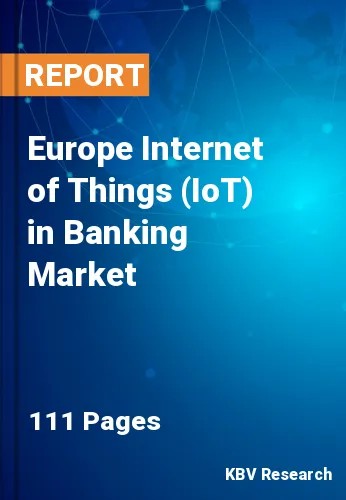The Europe Internet of Things (IoT) in Banking Market would witness market growth of 34.0% CAGR during the forecast period (2022-2028).
Banks could also anticipate debit transitions or credit card fraud, which enables them to take the necessary precautions to avoid issues. When a customer swipes their card, they confirm that they are the account holder via the system, and the bank can quickly accept or decline the transaction depending on the data acquired. Additionally, sensors can be installed within the warehouses of borrowers to keep an eye on inventory and raw supplies. The bank would use the monitored data to reduce the account balance or ensure that any loans are returned when inventory sales take place.
Mobile banking poses a threat to the modern branch network in banks. Financial institutions must employ technology to satisfy demand, even while banks are determined to protect the existing financial strategy and make sure it delivers value. In order to reconcile the conflict between mobile banking and traditional branch banking that is present, banks use the Internet of Things and other financial apps. For instance, biometric sensors can be used to collect user data as they enter the bank and transmit it to the main system. Bank executives may save back on labour and maintenance expenses while also cutting down on client wait times by using smart branches. The managers establish a networked method of communication among several branches in various locations.
Technology has the ability to reduce costs, increase efficiency, and reach the most vulnerable populations with financial services. Institutions are being touched by the present wave of digital innovation, which will be advantageous for both society and enterprises. In the field of banking services, the United Kingdom have long been a pioneer. A perfect fusion of rising technological demand, sensible regulation, user involvement in financial services, and the industry's approach to the financial crisis have all contributed to the banking sector's rapid rise in the UK and expansion of its geographic reach.
The Germany market dominated the Europe Internet of Things (IoT) in Banking Market by Country in 2021, thereby, achieving a market value of $6,340.4 million by 2028. The UK market would witness a CAGR of 32.9% during (2022 - 2028). Additionally, The France market is exhibiting a CAGR of 35% during (2022 - 2028).
Based on Offering, the market is segmented into Solution and Services. Based on Deployment Model, the market is segmented into On-premise and Cloud. Based on Enterprise Size, the market is segmented into Large Enterprises and SMEs. Based on Application, the market is segmented into Smart ATMs, Customer Management & Support, Security & Authentication, and Others. Based on countries, the market is segmented into Germany, UK, France, Russia, Spain, Italy, and Rest of Europe.
Free Valuable Insights: The Global Internet of Things (IoT) in Banking Market is Predict to reach $91.8 Billion by 2028, at a CAGR of 34.3%
The market research report covers the analysis of key stake holders of the market. Key companies profiled in the report include Microsoft Corporation, IBM Corporation, SAP SE, Oracle Corporation, Cisco Systems, Inc., Accenture PLC, Infosys Limited, Capgemini SE, Software AG and Vodafone Group Plc.
By Offering
By Deployment Model
By Enterprise Size
By Application
By Country
Our team of dedicated experts can provide you with attractive expansion opportunities for your business.

